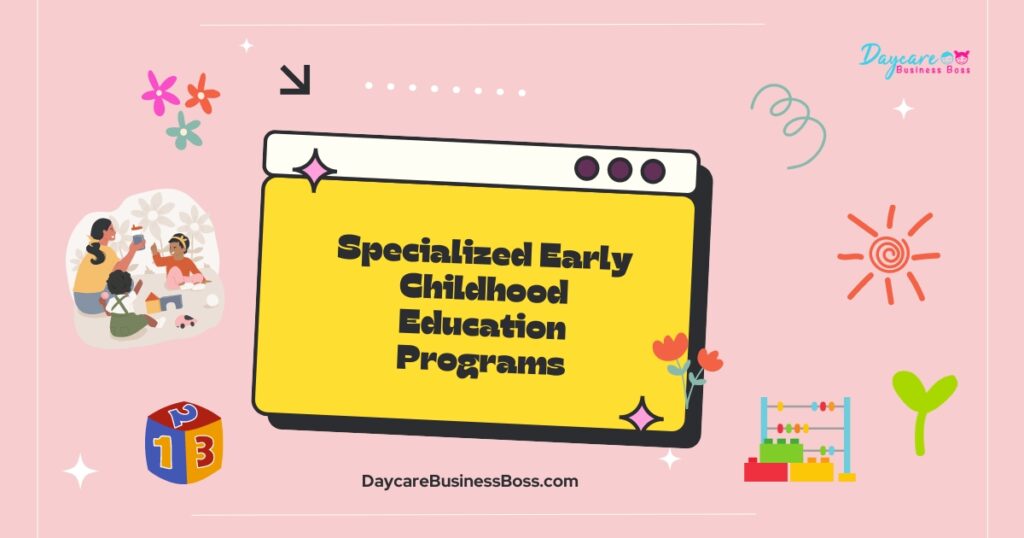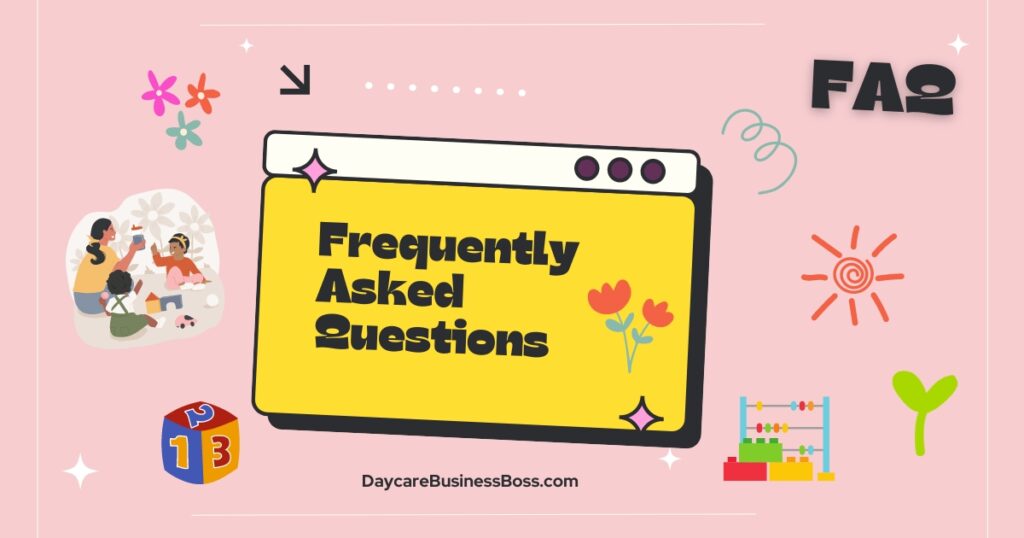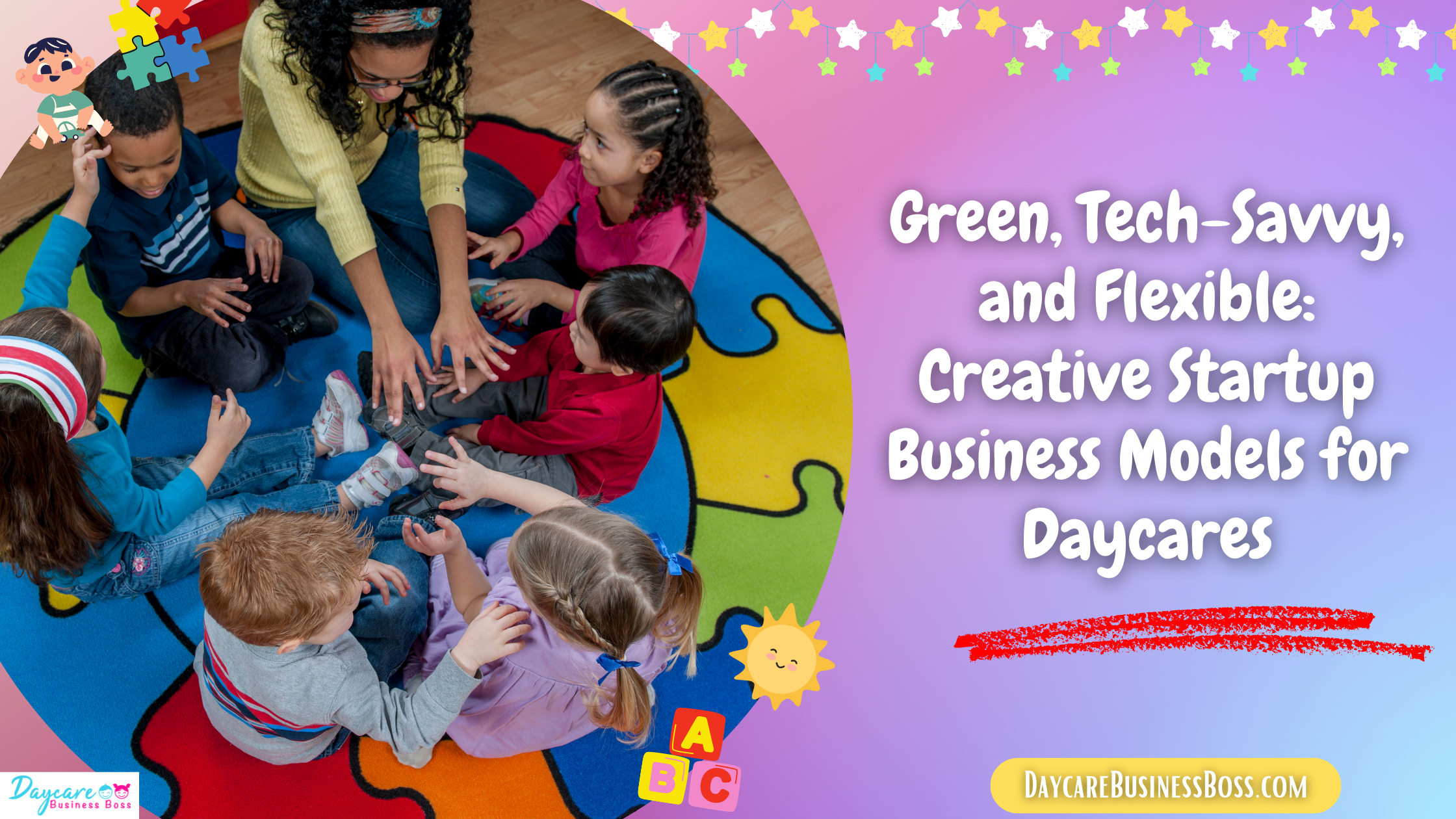Welcome to the world of new business enterprises geared toward society’s youth. In a world where parents must balance demanding occupations and their children’s developmental demands, the childcare business has evolved from a need to a platform for entrepreneurial ingenuity. As the landscape of early childhood education evolves, so do the chances for imaginative childcare startup business models.
The best startup business plan ideas for daycare include creating an eco-friendly, tech-integrated facility; offering specialized early childhood education programs; providing extended hours for working parents; emphasizing multicultural learning; and implementing a flexible drop-in service.
This article will lead you through an exploration of the dynamic and diverse concepts that are changing the way we look at daycare centers. In this changing context, achievement is defined by embracing innovation while supporting the holistic development and well-being of the children who will form our future.
Creating an Eco-Friendly Environment
In an era where environmental consciousness is growing, parents are turning toward daycare centers that embrace eco-friendliness as a core concept entirely. These institutes’ attractiveness stems not only from their promise to cultivate young minds but also from their commitment to ensuring a sustainable future. This fundamental change toward prioritizing the health of the earth is embedding environmental stewardship ideals in the next generation, laying the groundwork for a more conscious and responsible global community.
The incorporation of sustainable methods within daycare centers goes beyond mere trendiness; it represents a significant investment in both the welfare of the earth and the intellectual development of children. By incorporating energy-efficient lighting solutions into their environs, these facilities not only reduce operational expenses but also cocoon children in environments that encourage responsible resource management. Using recycled materials for toys and furniture encourages creativity while demonstrating the power of recycling and reimagining, enabling children to see objects as having numerous lives and uses.
Waste reduction measures, another pillar of eco-friendly daycare centers, provide numerous advantages. These approaches, in addition to reducing landfill contributions, teach youngsters about the interconnectivity of activities and their repercussions, cultivating a profound grasp of the circular nature of sustainable living. Children internalize lessons in resourcefulness and the beauty of minimizing waste as they see the transformation of organic waste into compost or the reincarnation of a discarded object into a new plaything.
Outdoor nature places that have been deliberately cultivated to grow alongside the educational journey provide a concrete link to the natural world. These aren’t simply play areas; they’re living classrooms where kids can explore, observe, and learn about the delicate balance of ecosystems. With their hands in the soil and their eyes tracing the flight of a butterfly, children build intimate contact with nature, forging memories and connections that serve as the foundation for lifetime environmental awareness.
Read more about: Daycare Entrepreneurship: Building Blocks for a Bright Beginning
Integrating Technology for Enhanced Learning
Incorporating technology into early childhood education offers a dynamic paradigm shift that has the potential to greatly improve the quality of learning experiences for young minds. The integration of technology and education is no longer a fad; it has matured into a powerful tool capable of harnessing children’s curiosity and fueling their cognitive development.
For youngsters, an array of interactive educational software, smart boards, and age-appropriate electronic devices serves as a portal to a fascinating world of information. These tools are intended to charm as well as educate, immersing children in an immersive journey of discovery where learning and play are effortlessly linked. Educational apps effectively translate complicated concepts into simple, digestible nuggets of information, responding to each child’s unique learning styles through vivid pictures, interactive quizzes, and fascinating tales.
Investing in touchscreen devices with tailored educational applications can be a strategic option for nascent daycares looking to create an everlasting impact. When used wisely, these screens become conduits for widening vistas. Children’s use of these devices is more than just screen time; it is a deliberate development of cognitive and creative abilities. Concepts that might appear abstract otherwise come to life, and logical thinking is refined as puzzles are answered with the swipe of a finger.
This technological voyage is not without consequences. The delicate balance between technology and traditional learning must be maintained through careful monitoring and use. Tactile play and face-to-face contact should never be overshadowed by technology. These encounters are where emotional intelligence and social skills grow. Setting boundaries and ensuring that technology supplements rather than replaces other forms of learning are thus critical.
Specialized Early Childhood Education Programs

The attractiveness of a daycare center stems from its ability to create a solid foundation for a child’s lifelong learning journey. Startup daycares are emerging as educational pioneers, with the extraordinary ability to create this foundation with elegance, delivering specialized early childhood education programs that adapt to the diverse tapestry of learning styles and developmental needs.
An array of personalized programs unfold within the loving walls of these institutes, each a committed avenue towards strengthening young brains. Workshops in art and creativity transform blank canvases into bright masterpieces, boosting self-expression and nourishing the seeds of imagination. These courses are more than just crafts; they are doorways to the investigation of colors, textures, and the infinite terrain of ideas.
Music and dance classes infuse the air with songs and movements that vibrate within the hearts of youngsters, in sync with the rhythm of creativity. These workshops are more than just rhythm instruction; they’re symphonies that elicit emotions and inspire coordination, revealing a world of harmony and self-awareness.
STEM-focused activities stoke the flames of inquiry and discovery. Children are engaged in a world of limitless curiosity as they tinker, build, and experiment. These activities set the way for future builders, scientists, and inventors by encouraging problem-solving and critical thinking from the start.
Language immersion programs, like portals to other realms, introduce children to the enchantment of communication. Children transcend boundaries in the symphony of words, opening doorways to diverse cultures and ideas. Children gain not only verbal proficiency but also the ability to overcome gaps and build connections with each new phrase they learn.
As these one-of-a-kind offers emerge, they not only distinguish the daycare center but also lay the framework for children’s overall development. Holistic development becomes the hallmark of these new daycares, preparing children not only for academic proficiency but also for lives filled with creativity, confidence, and the ability to seize the world’s numerous opportunities.
Extending Hours for Working Parents
Navigating the delicate dance between job obligations and parental responsibilities is a tightrope that modern parents must walk daily. The concept of longer daycare hours emerges as a transformative answer in this balancing act, offering a way toward harmonizing the demands of work and caregiving. This technique has the potential to not only revolutionize parental experiences but also to reinforce startups’ competitive position in the daycare business.
The rhythm of a working parent’s life frequently defies typical routines. Early morning meetings or late-night deadlines can frequently disturb the smooth flow of daycare drop-offs and pick-ups. The thought of working longer hours serves as a light of hope in this situation. Startup daycares provide a lifeline to parents in need of flexible caring options by expanding their operational boundaries to include early mornings and late evenings.
This practical method is more than simply a convenience; it is a significant stress reliever. Aligning work hours with tight daycare schedules can be difficult and emotionally draining. A revolutionary shift occurs, however, when parents find a daycare center that matches the flexibility they require. Stress decreases, allowing parents to focus on their professional ambitions without the looming shadow of daycare issues.
This customer-centric approach is not only pragmatic; it is also strategic. Startups that value extended hours carve out a distinct space for themselves in an industry dominated by standard operating hours. This deviation from the usual fosters a sense of loyalty and trust among parents, who become ardent supporters of the daycare’s services. The growth of the daycare gets entwined with the joy and contentment of its customers in this ecology of reciprocity.
Read more about: From Dream to Reality: Your Daycare Business Plan Unveiled
Embracing Multicultural Learning
The responsibility to nurture diversity and cultivate cultural understanding has never been more important in the tapestry of today’s global society. Startup daycares, as educational pioneers, have a unique potential to create inclusive environments that appreciate the diversity of the world’s cultures. These centers, when viewed through the lens of multicultural learning, have the potential to create a transformative ripple effect that extends far beyond their borders.
Startup daycares can become cradles of cultural exploration by incorporating diversity into their basic ethos. Diverse literature is an essential pillar, opening doors to far-flung locations and introducing youngsters to protagonists from backgrounds different from their own. These stories act as empathy triggers, assisting children in understanding the similarities and differences that bind people.
Arts and crafts, those universal languages of expression, are transformed into platforms for celebrating the kaleidoscope of civilizations. Children can replicate sophisticated designs, historic themes, and artistic skills that have their origins across countries through globally inspired creative undertakings. This tactile involvement not only builds an appreciation for artwork but also allows for a deeper connection to the civilizations that produce these manifestations.
Celebrations of several ethnic holidays are an important aspect of this experiential journey. These events provide youngsters with a real link to the traditions, customs, and festivities that distinguish diverse cultures. Children who participate in these festivals not only widen their horizons but also develop a deep appreciation for the traditions that influence the lives of others.
The impact of multicultural education extends to language, where exposure to various languages broadens linguistic and cultural horizons. Children begin to see the beauty of communication as a bridge between worlds as they hear the cadence of different languages. This exposure provides the groundwork for future language learning and raises awareness of the global community’s interconnectedness.
This immersive approach is important beyond the preschool years. Startup daycares that promote multicultural learning are planting seeds of tolerance and respect. These principles will underpin children’s interactions as they develop and navigate an increasingly linked world, molding their connections with peers from all walks of life and fostering a generation that thrives in the global tapestry of diversity.
Flexible Drop-In Services
Life’s tapestry is weaved with unexpected threads, and in the middle of its rich designs, parents frequently require last-minute childcare solutions. In response to this modern challenge, the concept of a flexible drop-in service arises as a lifeline, providing parents with a reliable shelter when the unexpected occurs. Within this unique framework, startup daycares have the potential to relieve parental stress while also establishing a reputation for flexibility and convenience.
A flexible drop-in service’s attraction stems from its capacity to bridge the gap between unpredictability and dependable care. Parents may be certain that their children are in good hands while they are caught up in a job obligation, running an essential errand, or responding to an unexpected event. This service functions as a safety net, guaranteeing that their children’s well-being is secure even in the face of uncertainty.
This method appeals to a varied clientele that includes freelancers, part-time professionals, and parents with erratic schedules. Traditional daycare choices may not be compatible with these folks’ unpredictable work schedules. A flexible drop-in service gives them the flexibility they seek while also accommodating their specific lifestyle needs.
The payment structure of this service emphasizes its adaptability. Implementing a pay-as-you-go system or a pre-purchased hours package meets a variety of needs while maintaining the financial stability of the daycare. The pay-as-you-go concept allows parents to only pay for the time their children spend at daycare, which saves money and provides transparency. Pre-purchased hours packages, on the other hand, provide reassurance by allowing parents to use the hours as needed while keeping consistency in the daycare’s operations.
A flexible drop-in service, aside from its practical ramifications, is a strategic move that propels startup daycares to the forefront of parental thinking. The willingness to accommodate unexpected events fosters a sense of trust between the daycare and parents, producing a loyal clientele who understand and value the daycare’s attention to their requirements.
Frequently Asked Questions

What are the advantages of an eco-friendly atmosphere for a daycare facility and its children?
There are various advantages to having an eco-friendly environment in a daycare center. It not only indicates a dedication to environmental sustainability, but it also sets a positive example for children, teaching them about resource management from an early age. Sustainable techniques, such as energy-efficient lighting and recycled materials, help to create a safer and healthier environment. Including outside nature areas strengthens children’s connection to the natural world, encouraging curiosity and an appreciation for the environment.
How can technology be effectively integrated into early childhood education without obviating the importance of conventional learning methods?
When utilized wisely, technology may be a powerful tool for improving early childhood education. Children can be engaged in learning experiences by using interactive educational applications, smart boards, and age-appropriate electronic devices. To maintain a balanced approach, technology should be used with purpose and in moderation, allowing children to engage in traditional forms of play and learning. Maintaining a varied range of activities, such as hands-on arts and crafts, physical activities, and social contacts, protects traditional learning methods from being overshadowed by technology.
What benefits do working parents get from expanded hours and flexible drop-in services?
Extensive hours and flexible drop-in services meet the needs of modern working parents, who frequently have tight schedules. These programs offer parents the convenience of drop-off and pick-up times that correspond with their work hours, decreasing stress and improving work-life balance. Parents with early morning or late evening commitments can also benefit from extended hours. Drop-in childcare services provide a safety net for unexpected situations such as urgent work meetings or emergencies, giving parents dependable daycare options even on short notice.
To learn more on how to start your own daycare checkout my startup documents here.
The information provided by DaycareBusinessBoss.com (“The Site”) is for general informational purposes only. All information on the Site is provided in good faith, however, we make no representation or warranty of any kind, express or implied, regarding the accuracy, adequacy, validity, reliability, availability or completeness of any information on the Site. Under no circumstance shall we have any liability to you for any loss or damage of any kind incurred as a result of the use of the Site or Reliance on any information provided on the Site. Your use of the Site and your reliance on any information on the Site is solely at your own risk.
This blog post is for educational purposes only and does not constitute legal advice. Please consult a legal expert to address your specific needs. Terms and Conditions. (https://daycarebusinessboss.com/terms-conditions/)

Meet Shawn Chun: Entrepreneur and Childcare Business Fan.
I’m a happy individual who happens to be an entrepreneur. I have owned several types of businesses in my life from a coffee shop to an import and export business to an online review business plus a few more and now I create online daycare business resources for those interested in starting new ventures. It’s demanding work but I love it. I do it for those passionate about their business and their goals. That’s why when I meet a childcare business owner, I see myself. I know how hard the struggle is to retain clients, find good employees and keep the business growing all while trying to stay competitive.
That’s why I created Daycare Business Boss: I want to help childcare business owners like you build a thriving business that brings you endless joy and supports your ideal lifestyle.

